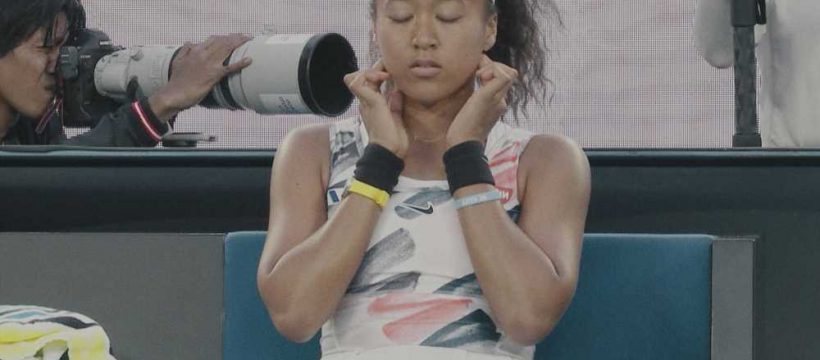More On:
naomi osaka
New fan rules and event cancelations announced for US Open
‘High demand’ Naomi Osaka Barbie doll sells out in hours
Naomi Osaka says Meghan Markle supported her after French Open exit
Naomi Osaka: I ‘should have been prepared’ for French Open aftermath
In the first episode of the new Netflix documentary series “Naomi Osaka,” the tennis star is shown leaving her fourth round 2019 US Open match, which she lost to Belinda Bencic. On her way out of Arthur Ashe Stadium, the defending champion walks by a plaque quoting Billie Jean King that reads, “Pressure is a privilege.”
Osaka doesn’t see it that way.
The current world No. 2, who lives in California but plays for Japan, withdrew from the French Open in June after failing to meet her post-match media obligations, saying it was for her mental health. The unusual move caused a tidal wave of controversy and began a conversation about the struggles faced by athletes in the spotlight. Osaka then skipped out on Wimbledon, too, but will play in this month’s Tokyo Olympics.
The pressures of fame — especially in a solo sport like tennis — can be overwhelming, she says.
“I think the amount of attention that I get is kind of ridiculous,” Osaka, 23, says in the doc, which streams on Netflix starting Friday. “No one prepares you for that, you know? It’s really weird sometimes.”
The series follows Osaka in the years after her breakthrough season in 2018, in which she defeated Serena Williams at the US Open to win her first grand slam and became the No. 1 player in the world. The messiness of that final (Williams was first docked a point and then a game for code violations, which led to Osaka being cruelly booed by some in the crowd) goes unmentioned in the show — even though Osaka said in her French Open withdrawal statement that she “suffered long bouts of depression” after that match.
Instead, we meet a very private person whose shyness masks an intense focus on victory and success. During her birthday dinner at a teppanyaki restaurant in Japan, Osaka asks her mother, Tamaki, “Do you think by the time I was 22, I would’ve done more? Or that this is, like, acceptable?”
‘I really need to mentally take a break and, like, chill out.’
Naomi Osaka on the nonstop pressure of public life
“It’s more than acceptable,” her mom quietly replies.
One moment viewers will look at with new eyes is Osaka’s interview with Ellen DeGeneres shortly after losing to Bencic. In the years since it aired, fans have learned about Osaka’s personal difficulties as well as the TV host’s alleged mean streak. During the awkward interview, it was right under our noses.
“Who did you play who, uh, beat you? What was her name?,” DeGeneres asks bluntly. “I was asking if she gets nervous before matches because that’s a lot of people. And I guess you get used to people watching you all the time, but that is a lot of pressure — of people watching you play, right?”
“Yes,” replies Osaka with a giggle.
“You’ve really come out of your shell,” the host mocks.
It’s around this time that Osaka gives clues to her eventual choice to pull back from future media appearances — and whole tournaments.
“I really need to mentally take a break and, like, chill out,” she says in the doc. “I should think about the future instead of always being stuck in the present.
“For so long I’ve tied winning to, like, my worth as a person. To anyone that would know me, they know me for being a tennis player. So what am I if I’m not a good tennis player?”
Osaka’s mentor who helped her through hurdles in her early career was the late Kobe Bryant. “Kobe kind of gives me real life advice,” she said at a press conference. “He’s someone that I sort of look up to as an athlete and also as a person.”
The documentary was being filmed when the basketball great died in a helicopter crash in January 2020, and Osaka emotionally reacted on a personal camera the crew provided her with.
“I’m feeling like I let him down,” she says. “Like, I’m supposed to carry on his mentality in tennis, and here I am, like, having — what? — I haven’t won a grand slam [since the 2019 Australian Open]. Like, I’m losing matches because I’m mentally weak, and… that’s so uncharacteristic of him.”
She adds: “I didn’t want to text him that because I didn’t want to feel like a loser, and now I’ll never have the chance to talk to him again.”
Osaka’s losing streak didn’t last much longer. She won the 2020 US Open — the first major tournament held during the pandemic — and once again caused a stir in the lead-up. After police shot Jacob Blake, Osaka refused to play her semi-final match in the Western and Southern Open in Cincinnati in protest.
“She stopped the game of tennis for a day,” her coach Wim Fissette says. “Which had never been done in history.”
Share this article:
Source: Read Full Article




